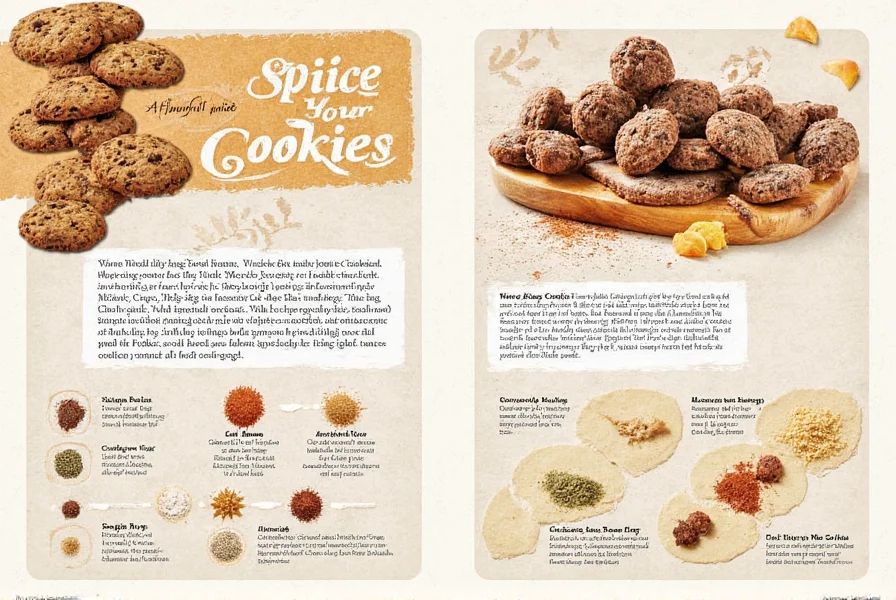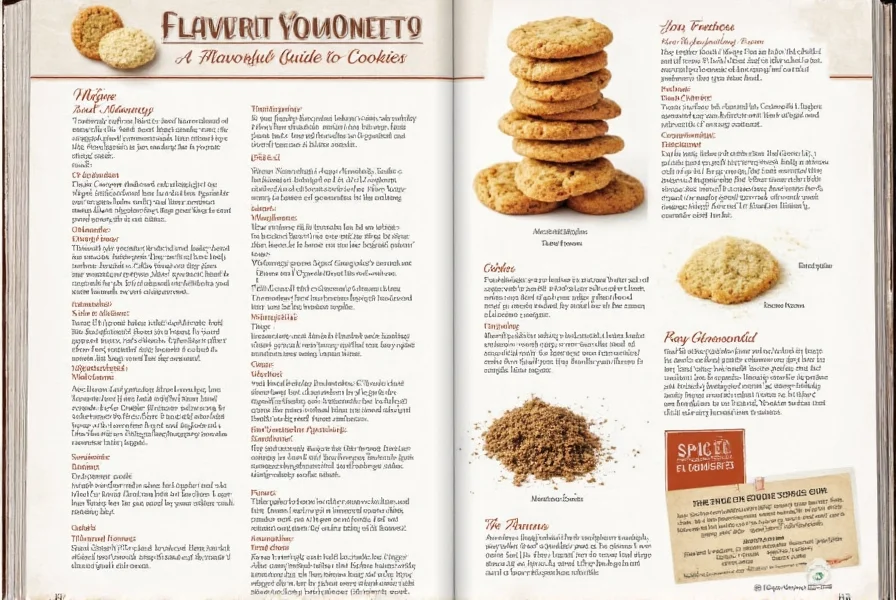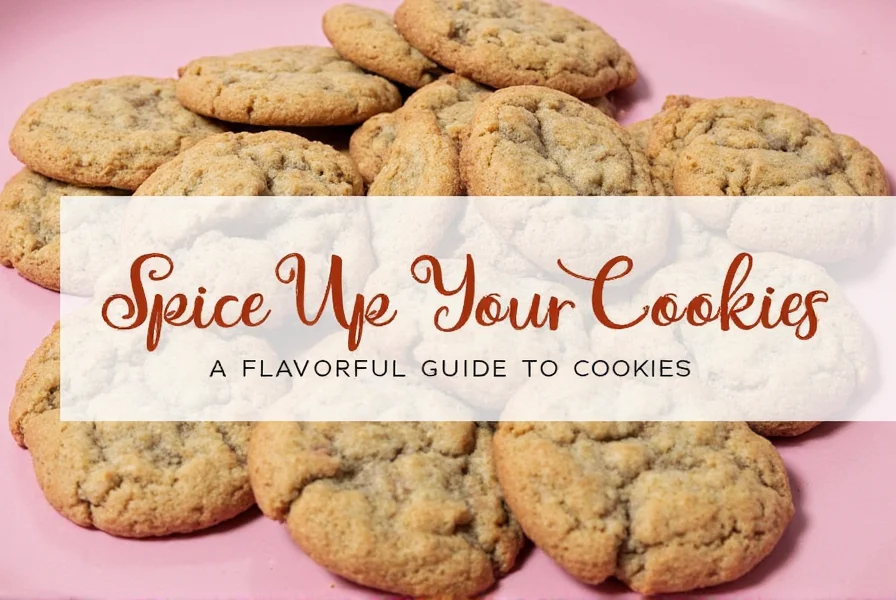Table of Contents
Introduction to Spices for Cookies
When baking cookies, the right spices can transform simple dough into extraordinary treats. Unlike "cookies seasoning"—a term rarely used by bakers—the correct approach focuses on specific spices that enhance flavor profiles while maintaining balance. This guide reveals the top 5 spices for cookies, how to use them effectively, and why they matter for every baker.

Top 5 Spices for Perfect Cookies
These five spices are proven to elevate cookie recipes without overpowering the base flavors. Each brings unique characteristics that work best with specific cookie types:
| Spice | Best Cookie Types | Key Flavor Impact | Usage Ratio (per dozen cookies) |
|---|---|---|---|
| Cinnamon | Chocolate chip, oatmeal, snickerdoodles | Warm sweetness with subtle spice | 1/2 to 1 tsp |
| Nutmeg | Pumpkin, sugar, shortbread | Earthy depth with nutty undertones | 1/4 to 1/2 tsp |
| Ginger | Gingerbread, molasses, spice cookies | Pungent warmth with citrusy notes | 1/2 tsp |
| Cardamom | Swedish, shortbread, chai-inspired | Floral complexity with lemony brightness | 1/4 tsp |
| Smoked Paprika | Dark chocolate, caramel, savory cookies | Smoky richness with mild sweetness | 1/8 tsp |
Cinnamon: The Classic Comfort Spice
Cinnamon is the most versatile spice for cookies, providing warmth without overwhelming sweetness. Its primary role is enhancing chocolate and buttery flavors while adding a subtle spicy note. For chocolate chip cookies, combine 1/2 teaspoon cinnamon with 1/4 teaspoon nutmeg for a balanced profile that complements the chocolate without masking it. Always use ground Ceylon cinnamon for superior flavor and lower coumarin content compared to Cassia varieties. Store in a cool, dark place to maintain potency for 12-18 months.

Nutmeg: The Warm Earthy Enhancer
Nutmeg adds depth to vanilla-based cookies and works exceptionally well with pumpkin or seasonal flavors. Its earthy, slightly sweet profile pairs perfectly with buttery shortbread or sugar cookies. For best results, grate whole nutmeg fresh when possible—pre-ground nutmeg loses potency within 6 months. Use no more than 1/4 teaspoon per dozen cookies to avoid bitterness. When baking pumpkin cookies, combine nutmeg with a pinch of cloves for a traditional holiday flavor profile.
Ginger: The Zesty Kick
Ginger brings a bold, spicy warmth that works in both sweet and savory cookie applications. For gingerbread cookies, use 1/2 teaspoon ground ginger combined with 1/4 teaspoon allspice for authentic flavor. Fresh ginger can be used for chewy textures, but requires 3x the amount of ground ginger (1 tablespoon fresh per 1 teaspoon ground). Remember that ginger intensifies during baking, so always start with conservative amounts. Pair with brown sugar for caramelized notes or with citrus zest for bright contrast.

Cardamom: The Exotic Twist
Cardamom’s floral, citrusy profile elevates cookies from ordinary to gourmet. It’s particularly effective in Scandinavian-style cookies like Swedish almond cookies or shortbread. For best results, crush whole cardamom pods to release oils before grinding. Use only 1/4 teaspoon per dozen cookies—too much creates a soapy flavor. Pair with vanilla or almond extract for a harmonious blend. Cardamom also works beautifully in dark chocolate cookies when combined with a pinch of sea salt.
Smoked Paprika: The Unexpected Surprise
Smoked paprika adds a subtle smoky depth to dark chocolate and caramel cookies without making them savory. Use only 1/8 teaspoon per dozen cookies to avoid overpowering the chocolate. This spice works best in recipes with high cocoa content (70% or higher) where its smokiness enhances the chocolate’s natural flavors. For a surprising twist, combine with a pinch of cayenne pepper (1/16 teaspoon) to create a "Mexican chocolate" effect that enhances sweetness without heat. Always choose sweet smoked paprika (not hot) for cookie applications.
Practical Tips for Using Spices in Cookies
- Start Small: Add spices in 1/8 teaspoon increments to avoid overpowering flavors. Remember spices intensify during baking.
- Pair Wisely: Combine no more than 2-3 spices per recipe. Example: cinnamon + nutmeg for classic cookies, or cardamom + vanilla for gourmet shortbread.
- Test Freshness: Rub a pinch between fingers—if no strong aroma, replace. Whole spices last 3-4 years; ground spices 1-2 years.
- Texture Matters: Cinnamon and nutmeg absorb moisture, creating thicker cookies. For chewier textures, reduce these spices by 20%.
- Seasonal Adjustments: Use warming spices (cinnamon, nutmeg, ginger) for winter cookies; lighter spices (cardamom, citrus zest) for spring/summer batches.

Frequently Asked Questions
How much spice should I add to my cookie dough?
For most cookies, start with 1/2 to 1 teaspoon of ground spice per dozen cookies. Add in 1/8 teaspoon increments and taste the dough before baking. Remember that spices intensify during baking, so it’s better to under-season initially.
Can I use fresh spices instead of ground spices in cookies?
Yes, but with adjustments. Fresh ginger or citrus zest adds moisture, so reduce other liquids by 1 tablespoon per tablespoon of fresh ingredient. Whole spices like cardamom pods should be crushed before use. For nutmeg, grate fresh directly into dough for maximum flavor.
What’s the best spice combination for chocolate chip cookies?
The classic combination is 1/2 teaspoon cinnamon + 1/4 teaspoon nutmeg per dozen cookies. For a sophisticated twist, try 1/4 teaspoon cardamom + 1/8 teaspoon smoked paprika. For a spicy kick, add 1/16 teaspoon cayenne pepper to enhance chocolate without heat.
How do I know if my spices are still fresh enough to use?
Check aroma: rub a pinch between fingers—if no strong fragrance, replace. Ground spices lose potency after 1-2 years; whole spices last 3-4 years. Store in airtight containers away from light and heat for maximum freshness.
Can I use savory spices in sweet cookies?
Absolutely! Smoked paprika (1/8 tsp) enhances dark chocolate cookies, while a pinch of sea salt (1/16 tsp) balances sweetness. Black pepper (1/16 tsp) in ginger cookies adds complexity without heat. Always start with minimal amounts and taste before baking.
Do spices affect how cookies spread during baking?
Yes. Cinnamon and nutmeg absorb moisture, resulting in thicker cookies. For chewier textures, reduce these spices by 20%. Spices with higher oil content (like some cinnamon varieties) may increase spread. Always test new spice combinations with a small batch first.











 浙公网安备
33010002000092号
浙公网安备
33010002000092号 浙B2-20120091-4
浙B2-20120091-4